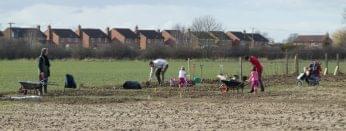The Joseph Rowntree Foundation’s annual report into the public’s opinion of what is necessary for a socially acceptable standard of living has highlighted increasing household budget shortfalls, especially for working families with children. The report comes as a release from the Office for National Statistics confirmed that in the first quarter of 2017, real household disposable incomes in the UK fell at their steepest rate since 2011. The fall has been attributed to a rise in inflation whilst incomes stagnate.
CEO of Caritas Social Action Network, Phil McCarthy, said: “This evidence that disposable incomes are falling in the UK is concerning. Our member charities support people struggling to make ends meet. Unable to buy essentials such as electricity, gas and food, they are borrowing money from friends and family to meet additional one-off costs, such as new shoes for their children, or repairs to household appliances.
If inflation continues to rise, budgets will be stretched ever tighter, and the Government should reconsider the freeze to working-age benefits.”
Single, working-age adults have seen the cost of a ‘minimum budget’ (as judged by public surveys) increase by 4.2% since 2016, pensioner couples by 2.8%, couple parents by 4.1% and lone parents by 3.8%.
Evidence also reveals that the amount that families have to spend – after tax and benefits are taken into account – fell by 2% in the first quarter of 2017, compared to 2016. The main reason for the fall was the rise in inflation, which hit 2.3% in the year to March, as over the same period wages rose by 2.1%.
Most working age benefits were also frozen for four years from April 2016. This included Jobseekers’ Allowance, Employment and Support Allowance, Income Support, Child Benefit, applicable amounts for Housing Benefit, Local Housing Allowance rates.






